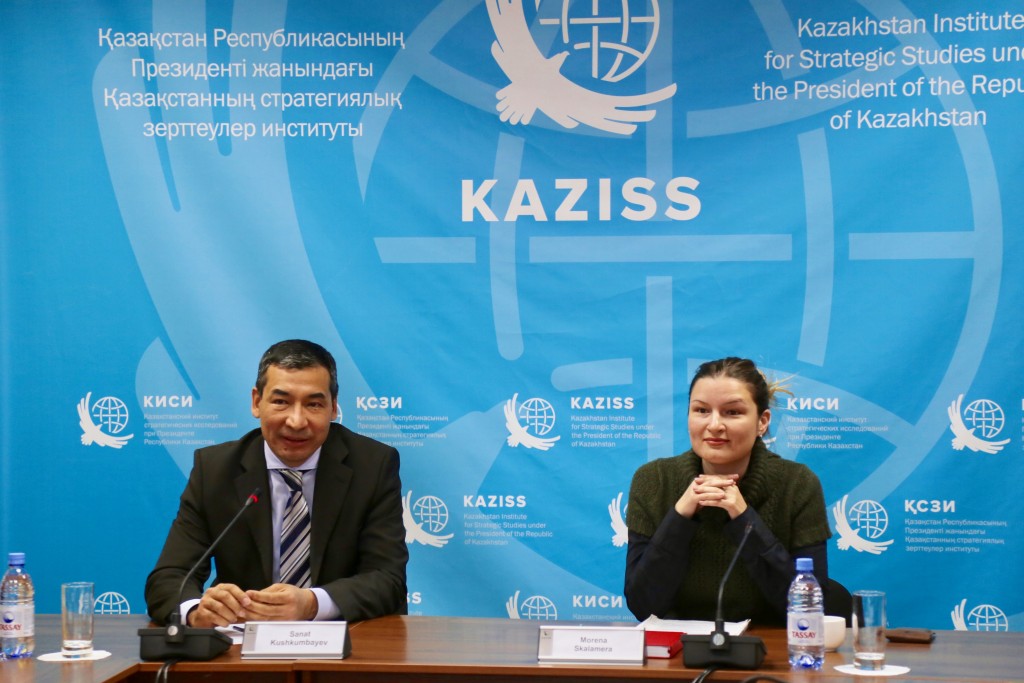ASTANA – Morena Skalamera, geopolitics researcher and director of the Applied Research Institute at Almaty-based Narxoz University, visited Kazakhstan to conduct research on the geopolitics of energy. She spoke exclusively with The Astana Times about her mission in the country and what she is hoping to uncover with her current research.
“I am here to conduct some research on the geopolitics of energy of this region, especially Kazakhstan… I had some very rewarding meetings. I had talks about my own past projects before starting to work on the energy situation of this region,” she said regarding meetings with government and private sector officials in the energy sphere.
The meetings were held at Kazakhstan Institute for Strategic Studies (KISI) and Nazarbayev University’s Graduate School of Public Policy, where the researcher talked about China’s and Russia’s cooperation in natural gas.
Skalamera assumed the new post at Narxoz (pronounced as Nahr-Khoz) University this fall and meetings related to the school were another reason for her trip. The stay afforded the opportunity to visit the subsidiary in the capital and become acquainted with its leadership.
Prior to joining Narxoz, Skalamera conducted research on the topic as an Associate on the Geopolitics of Energy Project at Harvard University. She received her PhD in Political Science and International Relations from the University of Trieste, Italy.
“In global meaning, research is perceived as a big opportunity. Narxoz will become part of the global process to make its contribution in developing Kazakhstan and the Central Asian region as a whole,” she noted, according to the university news on narxoz.kz.
Skalamera’s research centres on the oil and gas situation in Kazakhstan, how the country will meet its needs in terms of developing a good strategy in light of falling oil prices that she said are influencing Kazakhstan’s macroeconomics and budget and how falling oil prices are influencing governmental strategy and the market.
She is also interested in which recent reforms Kazakhstan has chosen not to launch in light of the oil price situation and what the country is doing in terms of renewable energy.
“This is the broad picture of what I am interested in… What is between China and Russia? Is that an opportunity, is that a challenge? If so, what are the challenges and opportunities?” she added.
“I hope to write a good project that will show the potential of this region. As I said earlier, I think Kazakhstan has done a good job. This year, you are celebrating 25 years of independence. You have gone a long way. You have done a great job in positioning yourself as one of the strongest economies in the region,” she noted.
Nevertheless, Skalamera added Kazakhstan is currently facing challenges like falling oil prices and issues such as plans for the next 25 years are an open and interesting question for her to discuss with the nation’s leadership.
“The research I was presenting today was about China and Russia reaching a big gas deal,” she said during the Nov. 23 expert meeting at KISI.
Skalamera also spoke about the energy potential of the Central Asian region and implementing projects in the energy sphere in the long run. China and Russia’s interest in Central Asia and potential outlines of international relations in the Asian region as a whole were addressed, the school reported on its website.
Her future project will be about Kazakhstan and Central Asia, although she does not have answers or conclusions yet because the project is just beginning. Skalamera still needs to do fieldwork, gather data, interview Kazakh residents and experts and speak with high-level officials and people in the energy sphere. This will be her first empirical research and she hopes to later publish a paper.

